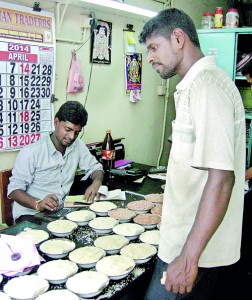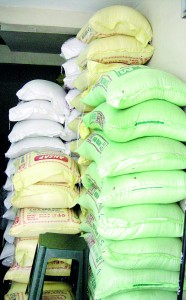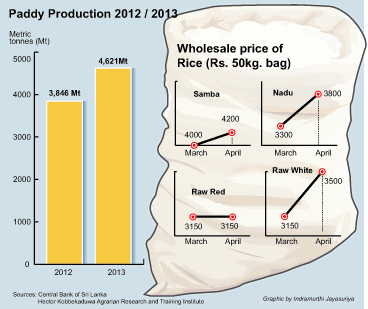News
Consumers cheated while traders caught in price trap on rice
Efforts by the Trade Ministry to keep rice prices down by imposing price controls on selected varieties has rebounded on consumers with low-quality produce being dished out in the markets.
The Government’s decision to impose price controls came a week ahead of the Sinhala-Tamil New Year after many small traders had already bought their stocks from paddy millers and major wholesale traders.

Pettah wholesale traders say price control has dealt them a blow. Pix by Athula Devapriya
The sudden announcement prompted retail traders to hold back some stock to avoid losses. Some made false claims that their products were of “superior” quality to sell them at higher than controlled prices.
The Gazette notification regarding price controls did not apply to rice varieties termed as “superior” quality.
“Usually I purchase red raw rice from the supermarkets. A few months ago I found that the neatly packed 10kg bags were no longer available. The bulk rice had shot up to Rs. 68 a kilo. After the price controls were announced the quality of the rice has drastically dropped and it almost looks like white rice,” said Anand Abeysinghe, 52, from Modara.
 He said that although traders claimed that some varieties are of superior quality and sold at higher prices he did not feel there was much difference in the quality compared to previous stocks purchased.
He said that although traders claimed that some varieties are of superior quality and sold at higher prices he did not feel there was much difference in the quality compared to previous stocks purchased.
“My question is, who decides on what is “superior” quality? How can the Trade Ministry check on the quality?” he asked.
A Trade Ministry spokesman said the price controls were imposed to prevent traders exploiting the average consumer. “We cannot control prices of the superior grades,” he said.
Retail traders claimed that during the New Year season they had incurred losses in trying to sell the rice stocks they had already bought.
V. Murugapoopathy, a wholesaler from 4th Cross Street, Pettah, said he had bought a huge stock of rice from mill owners at the old prices and when the price controls were introduced he had suffered a big financial loss.
“Now the controlled price of samba is Rs. 77, but we purchased stocks for Rs. 82. We are forced to sell at the reduced price, even though it is a loss for us,” he said.
T. Selvarajah, a wholesaler from Pettah who has been in business for more than 20 years, said, “The Government has already realised that there would be a shortage for rice in the future. That’s why taxes were removed for imported rice, knowing the effects the reduced controlled price would create. There is going to be a huge loss for the owners who had stocked for the long term.”
“Paddy cultivation in many parts of the country, including Kilinochchi and Batticaloa, is affected by the drought. In the next few months local suppliers will not be able to meet the demand,” he said.
Ranjith Karunatillake, President of the Rice Producers Association told the Sunday Times that though the harvest in the last season was good the yield in the forthcoming season was set to drop due to the drought.
“In view of this situation some of the big-time millers had purchased large stocks and were hoarding paddy. The traders here were forced to buy at higher prices. There are instances where we paid Rs. 40-42 for a kilo of paddy. If we purchase paddy at that price we should sell a kilo of rice for Rs. 77 to Rs. 80. But with price controls we could not do that,” he said.
“If the controls were introduced back in March the impact on the retail traders would have not been so high,” he said.
Traders claim that they were no longer in a position to travel to areas such as Polonnaruwa and purchase paddy as the large-scale paddy millers backed by politicians were buying up paddy stocks and also blocking farmers from selling paddy to traders coming from other areas.
He said large-scale paddy millers were gaining an undue advantage with political influence and in future they would be able to create a major impact in the markets.
Meanwhile paddy farmers in most areas hit by a short supply of irrigation water are already preparing to cultivate alternative crops.
“We are expecting that in Polonnaruwa some 100,000 acres of paddy land will not be cultivated in the Yala season,” a member of a farmers’ association in the area said.
Moneragala District remains one of the drought-affected areas with over 1000 acres of paddy being destroyed.
S. P. Sirisena from Moneragala, a member of the Executive Committee of the Samastha Lanka Govijana Sammelanaya said that as a result of the prevailing drought more than 800 peasant families were badly affected as they had lost their main source of income. “Almost all the farmers here depend on rainwater to harvest paddy. But for the last six months this area did not get sufficient rain and consequently the paddy crops were destroyed,” Mr. Sirisena said, adding that farmers from Tanamalwila, Wellawaya and Buttala areas were the worst affected in the district.
He said that harvesting generally takes place in March and April but this year the paddy fields were deserted.
“We can still see premature plants left to wilt in the fields. Some farmers even switched to alternative plantations such as corn and bananas but those too were destroyed because of the lack of rainwater,” he explained.
Apart from selling the paddy these families depend on their harvest to stock enough rice for personal use for about a year.
T.S. Premathilake, 75, a father of four from Bibile, Moneragala, cultivates nearly two acres of paddy land. He said that the drought had destroyed almost all the paddy in Bibile.
“We spent over Rs. 30,000 to plant the paddy this year. All that is destroyed now and the Government has not taken any steps to provide relief measures to the affected farmers in our area,” he said.
Mr. Premathilake said farmers had informed the authorities concerned about their plight but nothing had been done about it yet.
With all water courses drying up, people in the area fear that there will not be enough water for drinking purposes in the following months if the drought continues.
Kilinochchi District Secretary Rupavathy Ketheeswaran said Kilinochchi District, gripped by drought, has recorded a 40 per cent reduction in paddy cultivation compared with last year.
“Levels of water in the tanks have decreased significantly including in the Iranamadu Tank, the largest reservoir in the District. Many farmers depend solely on the tank water for cultivation,” she said.
The District Secretary said this year only 1,000 acres out of 16,000 acres could be cultivated.
In addition, most farmers have only recently been resettled in the district and are finding it very difficult to cope with the financial losses and associated social distress.
Mannar District Secretary M.Y.S. Deshapriya, commenting on paddy cultivation in his district, said, “This year, only 3,500ha of land can be used for cultivation, out of 22,500ha. The Yala season has almost been abandoned by farmers due to drought and lack of water in the tanks.”.
He said two-thirds of the farmers have been resettled recently and that the Government was taking steps to help them.
“Now we are collecting the details of the affected farmers, and the Disaster Management Ministry has allocated funds for this project,” he said.
Batticaloa District Secretary Mrs. P.S.M. Charles said that though there was no significant reduction of paddy cultivation in that area during the Maha season the Yala season was set to see a 40 per cent reduction this year.
A few years back it was predicted that Sri Lanka would be self-sufficient in rice but next week officials will be meeting to decide on plans for rice imports given the shortfalls in cultivation.
Reports: Aanya Wipulasena, Sandran Rubatheesan, Batapola Wijayasiri (Dunagaha) and K.Karunaratna (Polonnaruwa)

